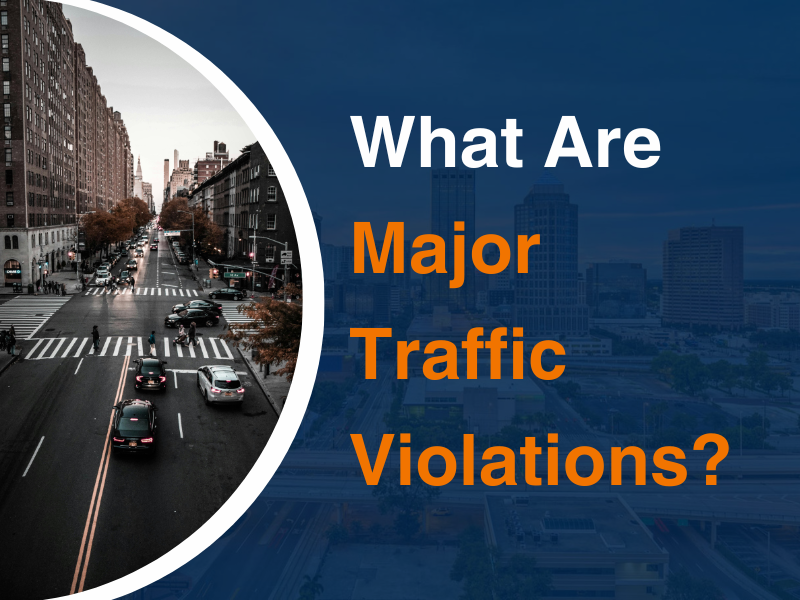Major traffic violations are serious offenses that significantly endanger public safety, including DUI/DWI, reckless driving, hit-and-run accidents, driving with a suspended or revoked license, and excessive speeding. These offenses often carry severe penalties such as hefty fines, license suspension or revocation, jail time, and substantial increases in insurance premiums. Additionally, major violations typically add points to your driving record and, in some cases, can result in a criminal record. It’s critical to address these violations promptly, often with legal assistance, due to their serious and long-lasting consequences.
Call Us For a Free Traffic Ticket Defense Consultation
Or, complete our short contact form
Table of Contents
- Factoid About Traffic Safety
- An Overview of Major Traffic Violations
- Common Types of Major Traffic Violations
- Legal Consequences and Penalties
- Preventing Major Traffic Violations
- The Aftermath of a Major Traffic Violation
- Need a Traffic Lawyer? Contact Sulte Law Firm Today
In the bustling world of today, where vehicles are an integral part of our daily lives, understanding major traffic violations has become crucial. These violations not only endanger the lives of individuals but also pose a significant threat to public safety.
With laws becoming stricter and penalties more severe, it’s essential to stay informed about what constitutes a major traffic violation and its consequences.
Factoid About Traffic Safety
| Fact | Statistic |
|---|---|
| Percentage of interactions with law enforcement via traffic stop | 44% |
| Traffic citations issued in 2018 | Over 40 million |
| Average daily traffic tickets issued | Over 125,000 |
| Percentage of traffic tickets contested in court | 5% |
| Gender more likely to contest traffic tickets | Women |
| Year of the first speeding ticket issued | 1910 |
| Age group with the most speeding tickets | 17 to 24 years old |
| Average rate increase in insurance premiums after a speeding ticket | 24.5% |
An Overview of Major Traffic Violations
Major traffic violations are serious breaches of road safety laws. They endanger lives—both the driver’s and others’. Understanding these violations can help prevent accidents and save lives. This section explains what major traffic violations are, their impact, and how they differ from minor infractions.
Definition and Importance
Major traffic violations are severe infractions that pose significant risks on the road. They range from driving under the influence (DUI) to reckless driving, each carrying serious consequences.
Understanding these violations is crucial for maintaining road safety and ensuring that drivers adhere to legal standards. These offenses not only affect the violator’s record but also endanger the lives of all road users.
The Impact on Road Safety
The impact of major traffic violations on road safety is profound.
Such violations contribute significantly to accidents and fatalities on the roads. For example, DUI offenses lead to thousands of deaths annually.
Recognizing the dangers associated with these serious infractions is essential for promoting safer driving habits and reducing traffic-related incidents.
Legal Consequences
The legal consequences of committing a major traffic violation are stringent.
Offenders may face heavy fines, license suspension, or even imprisonment, depending on the severity of the offense.
These penalties serve as a deterrent, emphasizing the seriousness of such actions and the legal system’s commitment to road safety.
Distinction Between Major and Minor Violations
Understanding the distinction between major and minor traffic violations is key to grasping the legal landscape of road safety.
Major violations are those that significantly endanger lives and property, while minor violations are less severe but still punishable offenses.
This differentiation helps in comprehending the level of threat each type of violation poses to public safety.
Common Types of Major Traffic Violations
Understanding the various forms of major traffic violations is essential for every driver. These infractions not only lead to severe legal repercussions but also significantly increase the risk of accidents on the road.
Reckless Driving
Reckless driving is a serious traffic offense that can have dire consequences for drivers, passengers, and pedestrians alike.
Characterized by a willful disregard for the safety of others, this behavior not only endangers lives but also carries significant legal repercussions.
- Excessive Speeding
- Aggressive Maneuvers
- Ignoring Traffic Signs and Signals
- Driving Under the Influence
- Distracted Driving
Driving Under the Influence (DUI)
Driving under the influence of alcohol or drugs is a grave offense with strict penalties.
DUI not only impairs a driver’s judgment but also their motor skills, exponentially increasing the chance of accidents.
Penalties for DUI can include fines, imprisonment, and license suspension, reflecting the severity of this violation.
Hit and Run Incidents
A hit and run occur when a driver involved in an accident fails to stop and provide assistance or exchange information.
This act is illegal and carries heavy penalties, including fines and jail time. It reflects a lack of responsibility and disregard for the well-being of others.
Vehicular Homicide
Vehicular homicide involves causing the death of another person through negligent or reckless driving. This is among the most severe traffic violations, often resulting in long-term imprisonment.
It highlights the utmost importance of driving responsibly to avoid tragic outcomes.
Speeding
Speeding is one of the most common traffic violations, defined as driving above the posted speed limit.
While it might seem minor, speeding significantly contributes to the likelihood of accidents and fatalities. Penalties for speeding vary but can escalate with the degree of the offense.
Legal Consequences and Penalties
The repercussions of committing major traffic violations are severe and varied. They are designed to penalize wrongful actions and deter future infractions. This section delves into the legal consequences and penalties associated with major traffic violations, highlighting the importance of adhering to traffic laws.
Fines and Financial Penalties
When it comes to dealing with the aftermath of a major traffic violation, one of the most immediate concerns for many is the financial impact.
Fines and financial penalties serve as a deterrent, aiming to discourage individuals from breaking traffic laws.
- Base Fines
- Court Costs and Fees
- Increased Insurance Premiums
- Restitution
Jail Time
Jail time is a potential consequence for serious traffic violations, such as DUI or vehicular homicide. The length of incarceration can vary from a few days to several years, reflecting the gravity of the offense.
This severe penalty underscores the legal system’s commitment to road safety and the serious nature of major traffic violations.
Points on Driving Record
Accumulating points on a driving record is a common penalty for traffic violations.
Each state has its own points system, where different violations carry a certain number of points.
Accumulating too many points can lead to license suspension. This system encourages drivers to adhere to road safety rules to maintain their driving privileges.
Mandatory Defensive Driving Courses
For certain offenses, courts may mandate the completion of a defensive driving course. These courses aim to educate offenders on safe driving practices and the consequences of traffic violations.
By completing these courses, offenders can sometimes reduce points on their driving record or even have charges reduced.
Community Service Requirements
Community service is another penalty that may be imposed for traffic violations. It involves performing unpaid work for the public good as a form of restitution.
The number of hours required can vary, but the goal is to foster a sense of responsibility and awareness of the impact of one’s actions on the community.
Preventing Major Traffic Violations
The prevention of major traffic violations is key to enhancing road safety and reducing the number of accidents and fatalities. This section explores various strategies and measures that can be taken to prevent such violations, emphasizing the role of education, awareness, and personal responsibility in promoting safer driving behaviors.
Educational Programs and Awareness
Educational programs play a crucial role in preventing traffic violations. These programs aim to inform drivers about the rules of the road, the consequences of violations, and the importance of safe driving practices.
Schools, driving schools, and community organizations often offer these programs, highlighting the need for continuous education on road safety.
The Importance of Defensive Driving
Defensive driving courses teach drivers to anticipate and react to potential hazards on the road. These courses cover topics such as speed management, environmental awareness, and the importance of maintaining a safe following distance.
By adopting defensive driving techniques, individuals can significantly reduce their risk of committing traffic violations and being involved in accidents.
Legal and Ethical Responsibilities of Drivers
Every driver has a legal and ethical responsibility to adhere to traffic laws and respect the safety of all road users. This responsibility includes driving sober, staying alert, and being considerate of others on the road.
Understanding and accepting these responsibilities are fundamental to preventing major traffic violations and ensuring the safety of everyone on the road.
The Aftermath of a Major Traffic Violation
Dealing with the consequences of a major traffic violation can be challenging. From legal proceedings to the impact on one’s driving record and insurance rates, the aftermath involves several steps that need careful attention.
Dealing with License Suspension
License suspension is a common consequence of major traffic violations.
If your license is suspended, it’s essential to understand the terms of the suspension and comply with all requirements for reinstatement. This may include completing a defensive driving course, paying fines, or attending a hearing.
Insurance Implications and Premium Increases
Major traffic violations often lead to increased insurance premiums. Insurance companies view individuals with serious infractions as high-risk drivers, resulting in higher costs for coverage.
It’s important to shop around for insurance options and explore potential discounts that may help offset the increase.
Legal Representation and Advice
Securing legal representation is crucial after being charged with a major traffic violation.
A knowledgeable attorney can provide valuable advice, represent you in court, and help navigate the complex legal system.
They can also negotiate on your behalf, potentially reducing the severity of penalties or dismissing charges in certain cases.
Need a Traffic Lawyer in Tampa? Contact Sulte Law Firm Today
Facing traffic violations can be daunting, but you don’t have to handle it alone.
Sulte Law Firm specializes in providing robust defense for traffic-related charges. If you need a Tampa traffic lawyer, give us a call at (813) 223-4343.
Our experienced team is here to help you navigate through the legal challenges and work towards a favorable outcome.

Ryan Sulte is the founder of Sulte Law Firm, a trusted Tampa traffic lawyer with over 20 years of experience and 10,000+ cases handled. Based in Tampa Bay, his firm is known for its personalized, transparent approach where every client is treated as an individual, not a case number.
A Florida native, Sulte earned his law degree from the University of Florida’s top-ranked Levin College of Law. He has dedicated his career to defending drivers across Tampa, including cases involving speeding, red light violations, suspended licenses, CDL citations, and DUI charges. Sulte’s deep familiarity with Hillsborough County courts and local enforcement allows him to craft strategic defenses that get results.

Leave a Reply